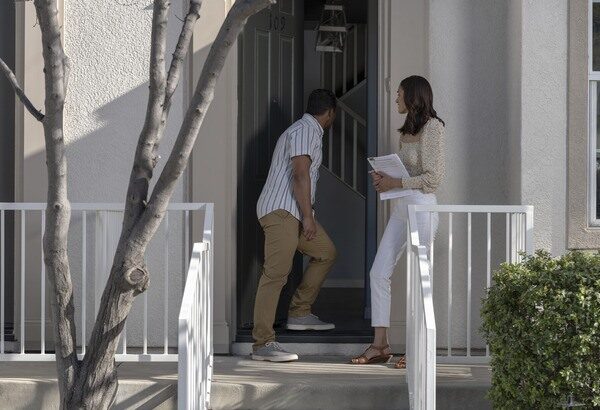
Looking for a home or apartment to rent can be difficult and stressful. Perhaps you’re competing with a large number of people for a specific unit, or you’re searching in a popular location. Often renters will wait until the last minute to look for another apartment, but it’s key to work ahead and have a search plan in place.
Check out these 10 tips for finding the best rental homes and apartments.
1. Start your apartment search 60 days before your move
It can be beneficial to start your search for a rental property as soon as you can. The more time you give yourself, the better your chances of finding a desirable apartment. Focusing on apartments that become available in the first two weeks of the month will generally give you the most options and the least competition, while the last week of the month will be the most competitive with fewer options. Plan your search accordingly and keep your main priorities and budget in mind. [1]
2. Search for rental listings online and through apps
Looking online and browsing through apps are good ways to start your search. Apps can let you know if a new listing pops up that matches your preferences. When using the app search features, you can narrow your options by amenities such as number of bedrooms, bathrooms, pet requirements, washer and dryer availability, and others. You can often take 3D tours or view floorplans to better understand layout specifics.
However, it’s important to note if you’re moving to a new city, apartment rental sites may not tell you some important details about each neighborhood, such as where the transportation is located or where to buy groceries. [1]
3. Use a real estate broker
Many people may be unaware, but some real estate brokers and agents can help renters find apartments. Agents can be a valuable resource because they have extensive knowledge about the rental market and can help you sort through apartment options quickly.
If you’re new to an area, agents can provide a wealth of information about neighborhoods and communities that may fit what you’re looking for. Before you sign an agreement with an agent or broker, be sure to understand whether they require you to pay a fee for their services. In some cases, an apartment landlord will pay a fee to an agent or broker to find a qualified tenant. In other cases, the apartment seeker will pay the broker fee. [2]
4. Don’t be fooled by apartment listing scams
You may be so excited about an apartment you saw online that you ignore the red flags of a rental scam lurking. For example, if a landlord wants you to wire money, pay in cash, cryptocurrency or through a payment app for a security deposit, it could be a scam. If you’re asked to pay a fee just to view the rental unit, that’s another sign you may be scammed. Consider taking the following precautions: [3]
- Complete detailed due diligence to avoid apartment listing scams
- Research the management company and read reviews
- Call the management company directly to verify that the unit listed online is truly a rental
- Drive by the apartment to ensure that it looks as advertised
- Consider working with a licensed real estate agent or broker to reduce concerns about getting caught up in a listing scam
- Use a credit card for any payments [3]
5. Consider roommates
You’ve found your dream apartment, but it’s a little out of your price range. The most obvious solution is to find a roommate to share in the expenses. Be sure to take caution when choosing a roommate and check their references to help avoid future legal issues. If you and your roommate both sign a lease, it’s considered “joint and several liability.” This means if the rent is $1,500 a month and one of you decides not to pay their $750 share, the landlord can still demand the full amount from the other tenant. You may want to ask the landlord for separate leases, so you’re only responsible for your part of the rent. [4]
6. Offer to take a longer lease
Negotiating a longer lease in exchange for a lower payment may be the way to get that expensive apartment you really want in a competitive market or popular areas of town. For example, you could offer to sign a 13- or 14-month agreement with your prospective landlord for a lower amount than a 12-month lease. [5]
7. Schedule apartment tours in different buildings
You should avoid signing a lease on an apartment without viewing it first. There are a variety of things to consider before handing over your security deposit and some important questions to ask yourself while touring the apartment, including:
- Is the unit as advertised?
- Does it include the amenities you were expecting?
- Is there damage, and if so will it be addressed before you move in? Is this in writing?
- Is it noisy? Consider street noise and interior apartment noises. [5]
8. Use social media
Social media is an option to research and gather intel about potential apartments and neighborhoods. You can create a post on your favorite social channel about your apartment hunt to get the inside scoop on rental units, landlords, management companies and more. Use an app such as NextDoor to gather information on what it’s like to live in a specific neighborhood or apartment building. [5]
9. Take a tour around the neighborhood
Looking for an apartment mostly involves an online search. As you narrow the field, it’s important to get out and see some of the neighborhoods you’re considering moving to. This will help you determine whether you like the area and if there’s transportation, grocery stores and other amenities nearby. You can also check out the building you’re considering to find out if the landscaping is trimmed and if the building has been kept up. [5]
10. Inform your family and friends
Let your social network know that you are apartment hunting. You never know when one of your connections may have a lead for you on a great building or a unit coming open. Perhaps you can put a deposit down on an apartment before it’s even listed. [1]
Tips for hunting for rental apartments
- Make a wish list: Set a budget, compile an apartment checklist and scout locations. First, plan your expenses. Consider what you can afford in rent, utilities, transportation, debts and more. Next, make a list of wants and needs, from important amenities to things you can compromise on. Finally, check out the neighborhood. Drive by the schools and local restaurants. Can you picture yourself there? Visit during rush hour and on the weekend. Learn more about first-time apartment searching tips.
- Prepare your documentation: If you’ve found a unit that meets your needs, fill out the rental agreement in advance, so you can present it at the showing and possibly get ahead of others in the process. Also, have your rental history typed up, proof of income and your driver’s license or state-issued ID at the ready.
- Ask questions: Make a list of questions to ask the property manager or landlord during your apartment tour. For example, is parking available? Do you have a pet policy? How do I file maintenance requests? [6]
Rental apartment hunting FAQs
How to find apartments for rent by owner?
Properties listed by owner mean the apartment is not being leased through a property management company but rather by the apartment owner who is considered the landlord. When you’re on an apartment listing site, check for the name of a single owner instead of a management company. Many landlords like to list on social channels because they are free and provide targeted ads. Also try driving through areas you like and searching out “for rent” signs. [7]
How to find rent-controlled apartments?
Rent-controlled apartments mean that a city or state government agency has placed restrictions on how much the rent can increase for certain units. As you can imagine, they may be challenging to find.
First, rent-controlled apartments can be inherited and, therefore, might never get listed on the open market. Second, not all states offer rent-controlled apartments. In the cities and states that allow it, these rent-stabilized apartments are usually registered, so start by checking in with the housing division of the city where you live. City council or other city officials may be able to point you in the right direction and provide resources, too. [8]
Once you find the perfect apartment or rental home, you’ll want to consider renter’s insurance. A landlord’s insurance doesn’t cover your belongings, so when the unexpected happens, you want to be covered.
Sources:
[1] “How to Find an Apartment: 11 Ways to Beat the Hot Rental Market,” Susan Kelleher, zillow.com/learn/how-to-find-an-apartment (Accessed May 2024).
[2] “Need Help Finding an Apartment? Use a Real Estate Agent to Find an Apartment,” Michele Lerner, realtor.com/advice/rent/would-a-realtor-help-us-with-a-rental (Accessed May 2024).
[3] “You’ve Got the Apartment? Spot Rental Listing Scams Before You Pay,” Royal Rose, consumer.ftc.gov/consumer-alerts/2023/08/you-got-apartment-spot-rental-listing-scams-you-pay (Accessed May 2024).
[4] “Legal Risks and Downsides of Sharing an Apartment or House with Roommates,” Beth Dillman, nolo.com/legal-encyclopedia/legal-liabilities-risks-of-sharing-apartment-house-with-roommates.html (Accessed May 2024).
[5] “How to Find an Apartment, 2023 Guide,” Yuki Graviet Knapp and Davina Ward, apartmentlist.com/renter-life/8-tips-finding-apartment-can-afford (Accessed May 2024).
[6] “36 Questions to Ask When Renting an Apartment,” Dr. Katherine Blake, Tristian Brown, and Susan Finch, apartmentlist.com/renter-life/questions-to-ask-when-renting-an-apartment (Accessed May 2024).
[7] “For Rent by Owner Apartments and How to Find Them,” Dr. Katherine Blake, Tristian Brown and Susan Finch, apartmentlist.com/renter-life/for-rent-by-owner-apartments (Accessed May 2024).
[8] “How You Can Find a Rent Stabilized Apartment,” Alicia Underlee Nelson, rent.com/blog/rent-stabilization/ (Accessed May 2024).
Disclaimer:
The information included is designed for informational purposes only. It is not legal, tax, financial or any other sort of advice, nor is it a substitute for such advice. The information may not apply to your specific situation. We have tried to make sure the information is accurate, but it could be outdated or even inaccurate in parts. It is the reader’s responsibility to comply with any applicable local, state, or federal regulations. Nationwide Mutual Insurance Company, its affiliates and their employees make no warranties about the information nor guarantee of results, and they assume no liability in connection with the information provided. Nationwide, the Nationwide N and Eagle and Nationwide is on your side are services marks of Nationwide Mutual Insurance Company. © 2024 Nationwide



